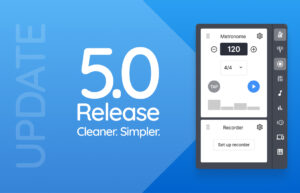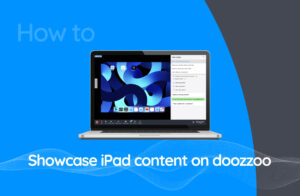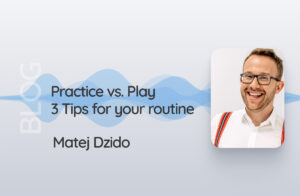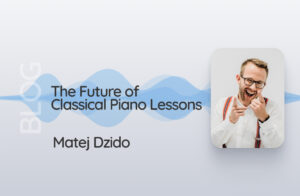I’m Philippe Geiss, saxophonist, composer, professor at the Strasbourg Conservatory and Superior Academy of Music / Haute École des Arts du Rhin, as well as a guest professor at the Senzoku Gakuen College of Tokyo and lecturer at the Paris Superior Conservatory of Music for Hybrid Teaching. I’m used to work on a repertoire that extends from classical to improvised music. I am passionate about innovations in space domain, musical instruments, digital sciences and metaverse.
Why did you start online music lessons?
During the Covid-19 lockdown, the main issue was how to continue teaching lessons to my students as well as master classes to distant students, at a time when travel had become impossible. So naturally, I started giving online lessons.
What do you think of online music teaching in general?
First of all, I would say that after several years of online lessons, I find that this way of teaching really has its place in music education.
For a variety of reasons, face-to-face lessons are not available to everyone. Online lessons offer a solution for many students who can work with a teacher on an ad hoc basis or over a longer term period.
It’s a very interesting alternative for remote students (from another region or country, people living in rural areas with transportation problems, weather problems, etc.), people who cannot travel (for health reasons, elderly or disabled people).
It is also a very useful solution for future students who can, for example, prepare for an entrance exam for the school or university of their dreams.
What were your biggest fears?
Individual music lessons are based on face-to-face lessons where every detail is important. This regular appointment allows the teacher to guide the student’s progress step by step while keeping him/her motivated. At the beginning of the Covid-19 period, the impossibility of giving the instrumental lesson was my main concern.
How to replace the face-to-face lesson? The video recording sent by the student and commented by the teacher is useful but incomplete because it lacks direct contact. Therefore my main concern was to find a solution for individual instrumental lessons. So I naturally became interested in online lessons. Having always a quality requirement for each of my actions, my first objective was to find an online lesson solution with a very good sound.
This search was long and hopeless until I discovered doozzoo and its great sound quality. I was finally able to set up quality online instrumental lessons. This was the beginning of the development of a new facet of my teaching.
How did you hear about doozzoo?
When I want to achieve a goal I keep on researching to find the solution. In 2017, I managed to send a saxophone to an astronaut friend (Thomas Pesquet) on the international space station (true story!), so finding a solution for online lessons had to be found.
I first heard about doozzoo while talking with a German musician friend. I tried it out and was immediately seduced. I then got in touch with the doozzoo team, who were very responsive to my needs. This is how I like to work with my partners, in this spirit of exchange, for example with Selmer for my saxophones, D’Addario for my reeds and now doozzoo for my online lessons.
A saxophone in space – Philippe Geiss / Thomas Pesquet
What has changed doozzoo for you?
My class has become even more international because online teaching has no geographical boundaries. I can now accompany future students and occasional students to meet their needs in terms of pedagogical support to help them achieve their artistic project.
Moreover, I have always fought to create bridges between different universes, I have long been attracted by distance learning tools (videos, tutorials) used for many years primarily by jazz and pop music schools. I am pleased to note that following the Covid period, classical music teachers are more and more interested in digital tools and their integration in teaching. The online lessons on doozzoo offer such a comfortable working environment that I personally really enjoy teaching online.
How do you see the future of music education and what value do you think online or hybrid education will have?
First of all, it is important to remember that distance learning has a long history. It started in the 19th century with correspondence lessons, then the radio, the telephone, audio and video supports, and of course the development of new technologies such as the internet.
Music education, although based on face-to-face teaching, has long used other media to complement the training. For example, listening to a concert, reading an analysis or listening to a recording have long been part of artistic education. Today the world is constantly changing, pandemics remind us that we may suddenly need to adapt, climatic and geopolitical disruptions invite us to think about changing the way we live and work. Adaptability is more than ever a necessity.
The recent Covid-19 experience was a gas pedal, but the integration of “Hybrid” education dates back to before the pandemic. For example, some hybrid teaching has been requested in Erasmus exchanges for some time now. Finding the appropriate pedagogical and technological tools, observing the advantages, disadvantages and areas for improvement for each teaching method, accompanying politics in their reflection, seeking a balance in good intelligence and adapting to daily needs, these are all topics I invite us to reflect on. I think that, at a time when we are only at the beginnings of the Metaverse world, online teaching has its place in the world of musical education.
Will you continue to teach (partly) online?
Currently I give some online lessons every week and I see the demand continuing to grow. Both for individual lessons, master classes and conferences.
In addition, because of my experience in the field of online teaching and digital tools, I am now frequently invited by institutions such as the Académie Supérieure de Musique de Strasbourg and the Conservatoire National Supérieur de Musique de Paris to train future teachers and help them develop their digital teaching skills.











